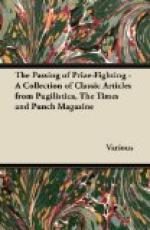The Scribe and the Artist, on their visit, were invited by all sorts and conditions of men to partake of champagne. The moment it was discovered that they were “connected with the Press,” the offerers of hospitality were absolutely overwhelming. But, obeying the best traditions of their order, they sternly, but courteously, refused all refreshment. It is fortunate they pursued this course, for had they received the entirely disinterested kindness of their would-be hosts, their recollections of the marvels of the Royal Naval Exhibition would no doubt have been of the haziest character imaginable. As it was, they were able to take their departure through the main entrance with some show of dignity, and not in a less imposing manner (as the Committee—Cook’s Gallery near the Dining-rooms—ho! ho! ho! ha! ha! ha!—would probably and amusingly suggest), by Tite Street.
* * * * *
Among the immortals.
Mr. Punch would be failing in his duty to Art and the British Public if he did not place on imperishable record his notes of the exceptionally brilliant Royal Academy Banquet of last Saturday. H.R.H. the Prince of wales made one of his best and briefest speeches, in which he feelingly alluded to the late Sir Edgar Boehm, R.A. Never was the President, Sir Frederick, more eloquent, or his themes more varied; for this occasion is noteworthy as being the first time in the history of this great annual representative gathering that the toast of Music and the Drama has been duly honoured. Sir Arthur Sullivan responded for the first, and Henry Irving for the second. Both made excellent speeches. Sir ARTHUR’S solo was most effective; his notes were in his head; he gave us several variations on the original theme, and cleverly played upon one word in saying that music had been “instrumental” on various historical occasions. Henry Irving followed suit; he spoke of Mrs. Siddons, Sir Joshua Reynolds, and of a professional gentleman, one roscius, mentioned, we believe, by Hamlet as having been, some considerable time ago, “a man of parts,” that is an Actor, in Rome. It was a great success. Sir Frederick then proposed the Lord Mayor, which may be briefly expressed as “a toast with a Savory to follow.” For “The Visitors,” Lord Justice Bowen, catching sight of the President’s classical picture (No. 232), made a happy hit about the delights of a honeymoon in the Infernal Regions, ending in the return of Proserpine to her mother Ceres by order of the Court above. Finally, the President, in summing up the losses to Art during the past year, paid a graceful tribute to the memory of Charles Keene, who, but a short while ago, was our fellow-worker on the staff of Mr. Punch With a hopeful allusion to the Storage of Artistic Force in the near future, the President concluded: but this Banquet of 1891 will long live in the recollection of all whose privilege it was to be present on so memorable an occasion.




